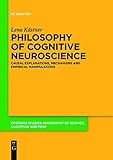Philosophy of Cognitive Neuroscience : Causal Explanations, Mechanisms and Experimental Manipulations / Lena Kästner.
Material type: TextSeries: Epistemic studies ; 37.Publisher: Berlin ; Boston : De Gruyter, [2017]Copyright date: ©2017Description: 1 online resource (266 pages)Content type:
TextSeries: Epistemic studies ; 37.Publisher: Berlin ; Boston : De Gruyter, [2017]Copyright date: ©2017Description: 1 online resource (266 pages)Content type: - text
- computer
- online resource
- 3110530945
- 9783110529203
- 3110529203
- 9783110530940
- Cognitive neuroscience -- Philosophy
- Neurosciences cognitives -- Philosophie
- PHILOSOPHY -- Essays
- PHILOSOPHY -- Reference
- Kognitionswissenschaft
- Neuropsychologie
- Philosophie
- (Produktform)Electronic book text
- (Zielgruppe)Fachpublikum/ Wissenschaft
- (BISAC Subject Heading)PHI004000
- (BISAC Subject Heading)SCI089000: SCI089000 SCIENCE / Life Sciences / Neuroscience
- Wissenschaftstheorie
- Interventionismus
- Neurowissenschaften
- Neuroscience; philosophy of science; interventionist causation
- (VLB-WN)9526
- Neuroscience
- interventionist causation
- philosophy of science
- (Produktrabattgruppe)PR: rabattbeschränkt/Bibliothekswerke
- 100
- QP360.5 .K37 2017
- 100
- CC 5680
| Item type | Home library | Collection | Call number | Materials specified | Status | Date due | Barcode | |
|---|---|---|---|---|---|---|---|---|
 Electronic-Books
Electronic-Books
|
OPJGU Sonepat- Campus | E-Books EBSCO | Available |
Frontmatter -- Preface -- Contents -- List of Figures -- 1. Introduction -- Part I: Stage Setting -- 2. Braining Up Psychology -- 3. The Life of Mechanisms -- 4. The Interventionist View -- 5. Intermezzo: What's at Stake? -- Part II: Puzzles -- 6. The Unsuccessful Marriage -- 7. Causation vs. Constitution -- 8. Beyond Mutual Manipulability -- 9. Interventionism's Short-Sightedness -- 10. Intermezzo: Well Then? -- Part III: Shopping for Solutions -- 11. Fixing Interventionism -- 12. Mere Interactions -- 13. Excursus: A Perspectival View -- 14. Mere Interactions at Work: A Catalog of Experiments -- 15. Conclusions -- References -- Key Terms -- Index.
How do cognitive neuroscientists explain phenomena like memory or language processing? This book examines the different kinds of experiments and manipulative research strategies involved in understanding and eventually explaining such phenomena. Against this background, it evaluates contemporary accounts of scientific explanation, specifically the mechanistic and interventionist accounts, and finds them to be crucially incomplete. Besides, mechanisms and interventions cannot actually be combined in the way usually done in the literature. This book offers solutions to both these problems based on insights from experimental practice. It defends a new reading of the interventionist account, highlights the importance of non-interventionist studies for scientific inquiry, and supplies a taxonomy of experiments that makes it easy to see how the gaps in contemporary accounts of scientific explanation can be filled. The book concludes that a truly empirically adequate philosophy of science must take into account a much wider range of experimental research than has been done to date. With the taxonomy provided, this book serves a stepping-stone leading into a new era of philosophy of science--for cognitive neuroscience and beyond.
In English.
Online resource; title from PDF title page (publisher's Web site, viewed 30. Jun 2017).
Includes bibliographical references and index.
eBooks on EBSCOhost EBSCO eBook Subscription Academic Collection - Worldwide
There are no comments on this title.

